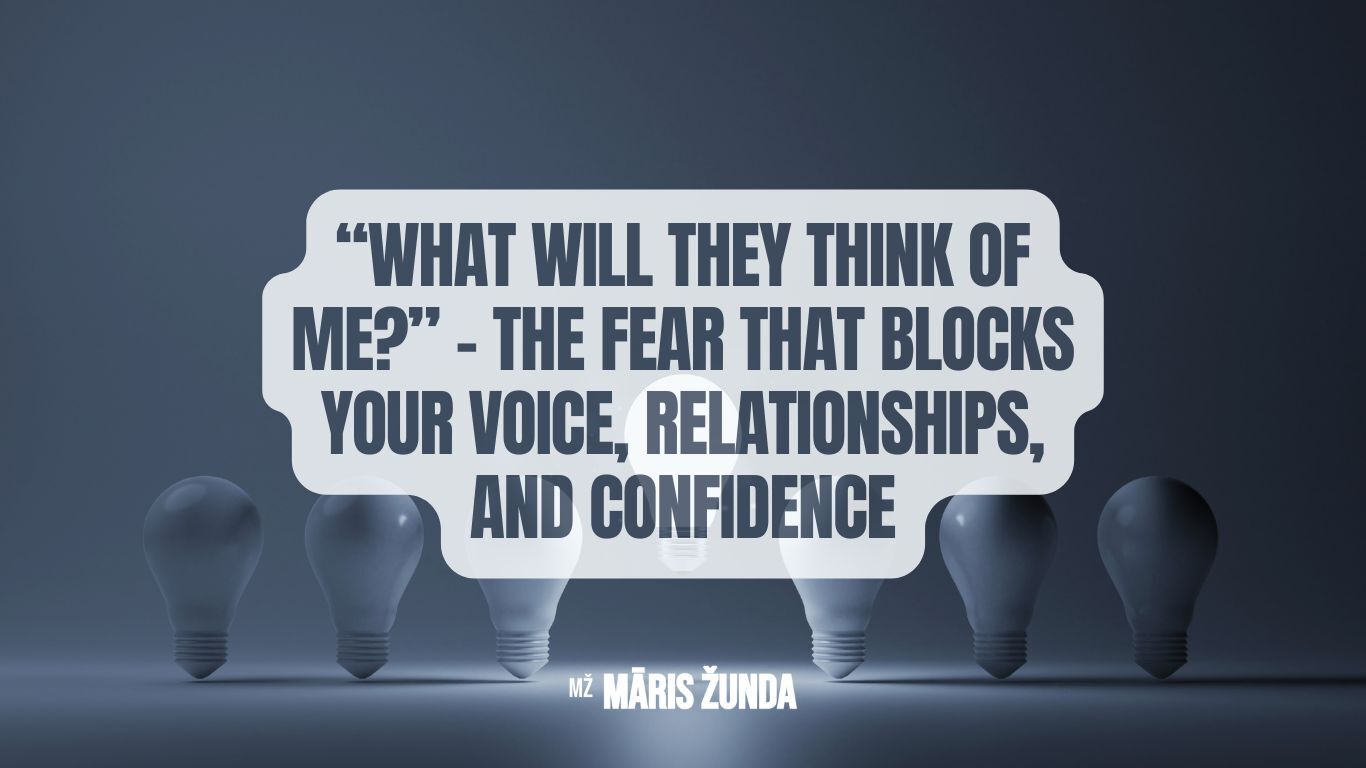“What Will They Think of Me?” – The Fear That Blocks Your Voice, Relationships, and Confidence
There’s a small but powerful question that quietly shapes the lives of many people: What will they think of me?
This phrase is more than just a passing thought before public speaking—it’s often a deep-rooted fear that silently affects our ability to express ourselves, build meaningful relationships, or handle conflicts.
If left unaddressed, it becomes a kind of invisible wall, separating a person from their own potential. In this article, we’ll explore how this subconscious fear of judgment shows up as anxiety in public speaking, why it blocks connection and self-expression, and how to work with it using a psychological and hypnotherapeutic approach.
Fear of Judgment Isn’t Rational—It’s Automatic
Public speaking anxiety is often misunderstood. It’s not just “stage fright” or shyness. In many cases, it stems from an old emotional association: that being seen means being judged.
This usually begins in childhood—maybe someone was mocked in front of the class, criticized by a parent, or punished for “drawing attention.” Over time, we start to associate visibility with danger. Not physical danger—but emotional: “If I mess up, they’ll reject me. I’ll lose love. I’ll be alone.”
Even if we know logically that there’s no real threat, the body responds as if there is: tension, dry mouth, shaky hands, blank mind. That’s because the subconscious still holds onto the old equation: Visible = Vulnerable.
This Same Fear Blocks Relationships Too
It’s not just about speaking in front of a crowd. This fear of judgment blocks connection at every level.
To truly connect with someone—to build intimacy, to resolve a conflict, to share your truth—you have to be visible. And if your subconscious believes that being seen is unsafe, it will sabotage that moment.
Instead of honesty, we hide.
Instead of expressing a need, we pretend we’re fine.
Instead of opening up, we withdraw.
This leads to shallow connections and unresolved issues—not because we’re incapable of connection, but because our system sees emotional exposure as a threat.
Where Does This Subconscious Program Come From?
Fear of being judged is not something we’re born with. It’s something we learn—often through painful or humiliating moments in early life, like:
- being mocked or criticized when we tried to speak up
- growing up in environments where mistakes were punished
- learning that love was conditional on performance or perfection
From these experiences, the subconscious forms beliefs like:
- “If I’m not perfect, I’ll be rejected.”
- “I must not show weakness.”
- “I can only speak if I’m sure I won’t mess up.”
These beliefs become internal programs—scripts that play automatically whenever we face exposure or vulnerability. They’re not conscious thoughts; they live in the nervous system.
Why Positive Thinking Isn’t Enough
You might try to talk yourself out of the anxiety: “I’m safe,” “It’s just a presentation,” “No one is judging me.”
But these affirmations often don’t reach the part of the brain responsible for fear—the limbic system. That’s because this reaction isn’t coming from logic, it’s coming from emotional memory.
Unless we go deeper—into the subconscious—these automatic responses stay locked in.
Hypnotherapy: Rewriting the Fear Where It Lives
Hypnotherapy works by bypassing the critical mind and accessing the subconscious directly—the place where these old emotional associations are stored.
We don’t just treat the symptom (e.g. “I freeze up when speaking”), we address the root: the original moment when the subconscious learned “It’s not safe to be seen.”
In session, the client enters a relaxed but focused state, where the mind is more open and receptive. Together, we may revisit a childhood memory—say, being humiliated in front of the class—and introduce a new experience into that moment: safety, validation, support.
Instead of reliving trauma, we reframe it.
Instead of being alone, the inner child is comforted.
Instead of rejection, they feel acceptance.
The brain processes this new experience as real. Neural pathways shift. The belief begins to change.
From Fear to Voice
When the subconscious no longer sees visibility as dangerous, everything changes. Speaking becomes less about proving yourself and more about expressing yourself.
The anxiety fades—not because the audience disappears, but because your system no longer sees them as a threat.
Relationships deepen.
Conflicts become conversations.
You stop editing yourself to fit in, and start showing up as you are.
It begins with one decision: to stop living from “What will they think of me?” and start asking “What is true for me?”
Final Thoughts
If fear of judgment is keeping you from speaking, connecting, or being seen—it’s not a flaw in your character. It’s a protective program, based on outdated experiences. And it can be rewritten.
Working with the subconscious isn’t about pretending everything is okay. It’s about creating a real shift—from inside out—so your voice, your presence, your truth no longer feel like a risk.
You are not here to be perfect. You are here to be real.
And when that becomes safe, everything opens up.

